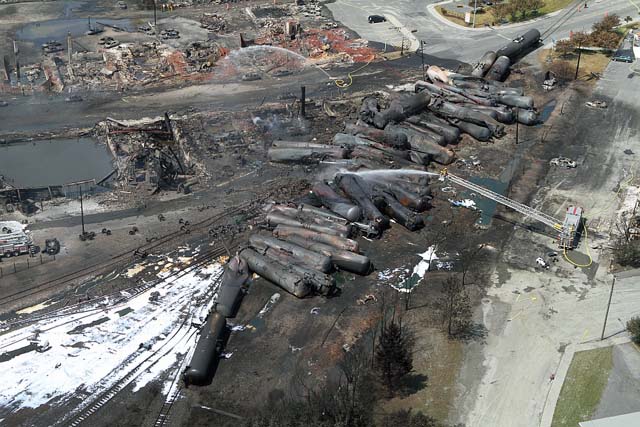A fire truck pours water on the wrecked tank cars at Lake Megantic - Date/Photographer unknown - TSB. 5 April 2014 Fatal Quebec Rail Crash
Still Making Waves Lake Megantic Quebec - Botched handling of the Lake Megantic railway explosion means the town is bracing for a possible environmental aftershock a year after the disaster.
When a freight train carrying crude oil exploded last July, killing 47 people, it left fires burning throughout the Quebec town.
The local volunteer fire department was unaware that they needed special foam to put out oil fires.
Instead, they used water for two days.
This caused the oil to spread, not just to the adjacent lake that gives the town its name, but also to a nearby river, the Chaudiere River, that runs all the way north to Quebec City.
Media reports at the time said the oil spread as far as one community 80 kilometres away.
Officials feared contamination and nearby residents were told to boil their water for safety.
But now there are fears of oil that sank to the bottom of the lake spreading again with the spring thaw.
"They didn't have the right equipment when this huge fire happened. They didn't know what they were facing, and it's only voluntary firemen," said Richard Boudreault of the United Steelworkers, who represent rail workers.
Boudreault testified before the House of Commons transport committee late last month, which is studying rail safety.
He urged more training and information be given to first responders.
What everyone wants to know is whether another Lake Megantic could happen somewhere else in Canada.
In the months since then, the government has made changes but municipalities say they still have concerns.
Most prominently, federal Transport Minister Lisa Raitt ordered rail companies to keep local governments appraised of when dangerous materials will be transported through their areas.
That change won praise from the Federation of Canadian Municipalities.
But FCM president Claude Dauphin says they still have concerns that some materials aren't being taken seriously enough.
Raitt said crude oil will be classified as a dangerous material, meaning rail companies must have what's called an emergency response assistance plan if something goes wrong.
Dauphin said municipalities want the dangerous material definition extended to all flammable materials.
The government raised eyebrows with its recent budget bill when it eliminated the requirement to notify the public if it changes railway regulations.
Currently the Railway Safety Act requires new railway regulations to be posted publicly for 90 days before they are implemented.
The budget bill strips this requirement.
Opposition MPs are calling this a dangerous change.
"Experts will no longer have enough time to provide their opinion. We need stricter railway safety rules, not looser ones," said NDP MP Hoang Mai in the House of Commons this week.
Raitt responded that the change was to give government the flexibility to keep up with the United States on safety changes.
"It is making sure that we are doing exactly the same things on a quick basis in order to protect the country," she said.
The Federation of Canadian Municipalities will discuss the change when its working group on rail safety meets in Ottawa later this month.
Dauphin says he expects his group to call on the government to preserve the 90-day notice period.
Also of concern is the still common use of older Dot-111 model tank cars that are more easily punctured than newer models.
The train carrying crude oil into Lake Megantic was made up of Dot-111 model cars.
Cars built since October 2011 were built to a higher safety standard.
The Transportation Safety Board of Canada is calling for the cars to be quickly phased out.
Raitt could not be reached for comment Friday.
Halifax Mayor Mike Savage said there is more work to be done but things have come a long way since last summer.
"The most important thing for us is to have the information as quickly as possible so we can respond. We want to know in advance if there's something potentially dangerous moving through," he said.
Paul McLeod.    | 
